GUIDE TO LIFE
III Productive Living
IV Autobiography
V Beauty
VI Art-Making
- Contexts That Can’t Be Ignored
- Repeating Works
- Appropriation (Bosch “Christ Mocked”)
- Overcoming Failure (What Are Black Holes?)
- Appropriation (Piero della Francesca "Flagellation")
- Appropriation (Piero della Francesca "Battista Sforza & Federico da Montefeltro")
- The Answer To Everything
- Guide To Life Archive
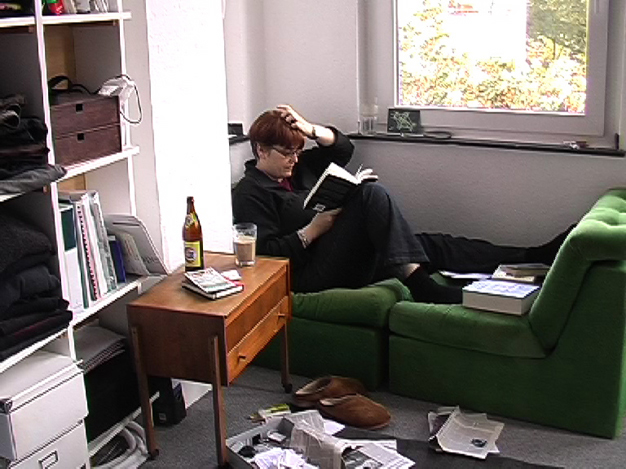
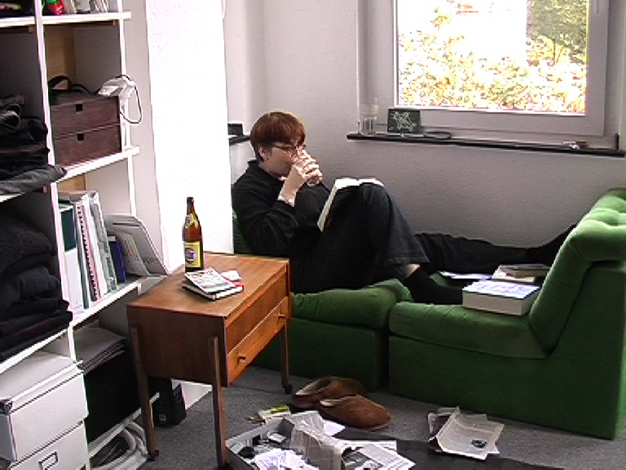
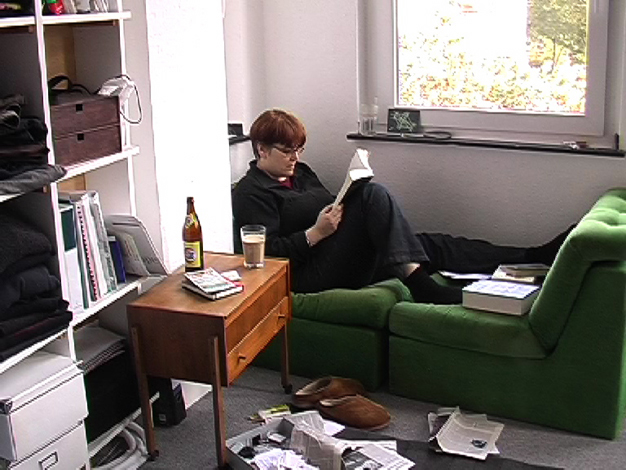
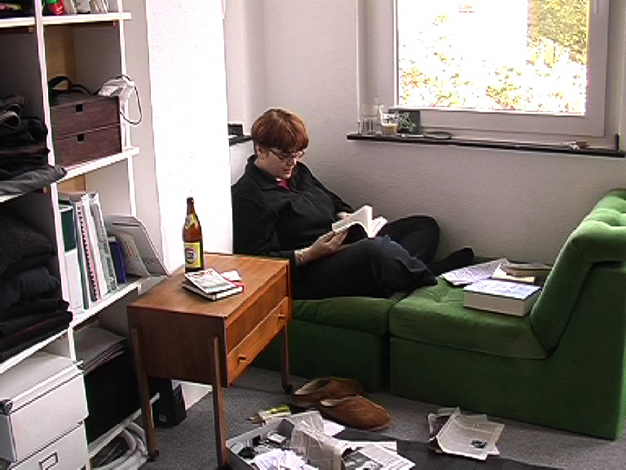
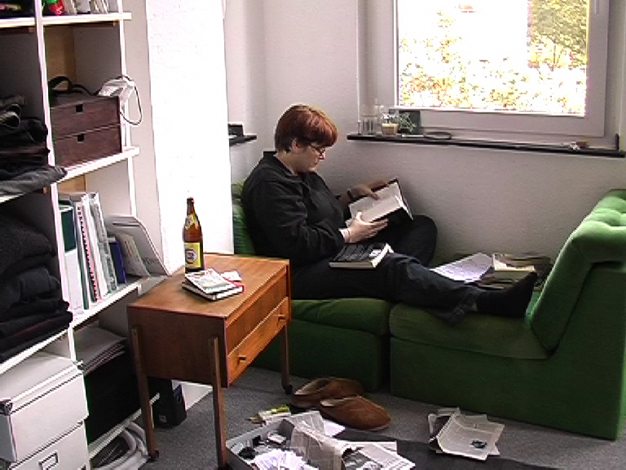
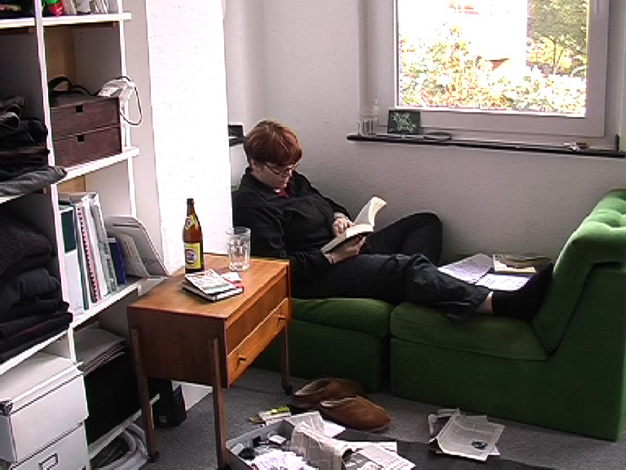
An evening event at the artists' exhibition project "WG", Malkasten, Düsseldorf, 2004
The work was in the form of a photocopied handout and a video playing on a monitor
Project for "WG", Malkasten, Düsseldorf 14/10/2004
PLANNED:
GUIDE TO LIFE II.5:
Chapter II Necessary Knowledge
5. What Are Black Holes?
Lecture
The lecture is entitled “What Are Black Holes?” and is one possible form for realizing the work “Guide To Life II.5: Necessary Knowledge: What Are Black Holes?”
REALIZED:
While preparing the lecture I found myself increasingly confronted by questions which threw serious doubt on the legitimacy of my intentions and ultimately compelled me to abandon my plans to realise the work “What Are Black Holes?” in this form. This conflict resulted in a new work within Guide To Life:
GUIDE TO LIFE VI(B).5:
Chapter VIArt-Making
Part B Strategies
5. Overcoming Failure
Example: “What Are Black Holes?”
Lecture (planned, not realized), Explanatory Text, Video
EXPLANATORY TEXT
Problems Which Compelled Me to Abandon the Planned Lecture
“Guide To Life II.5: What Are Black Holes?”
The problems were encountered when I came to consider how the lecture “What Are Black Holes?” could be conceptually integrated into my artistic practice. (N.B. “lecture” is a strategic classification which is integral to the title: given that the socalled lecture is clearly positioned within an artistic practice it must be actually understood as a performance) A lecture seemed to be the most logical form in which to realize the work “What Are Black Holes?”, given that on the one hand the work was about the communication of specific factual content, and that on the other hand the forum in which it was to be realized was confined to a single evening and demanded a solution with event character. At first the problems seemed to be largely practical in nature, and were centred on the form and content of the lecture itself and how I should best position myself in my role as the one giving the lecture. It gradually became clear however that these at the first glance purely practical problems were in reality a conceptual minefield. My attempts to resolve these problems ultimately ended in failure.
With regard to Guide To Life: although it is certainly designed to communicate specific conceptual or expressive intentions, it is above all an artistic strategy that was formed in response to my particular, personal artistic needs. Guide To Life offers me a feeling of security, or better an illusion of security, within the otherwise almost unbearable arbitrariness and self-indulgence of an artistic practice, which in turn takes place within the otherwise almost unbearable pointlessness of life itself.
While planning the lecture it became increasingly clear to me that the way in which I position myself as the one giving the lecture would be absolutely critical for the correct reception of the work. I had already read a great deal about black holes and general physics and had concentrated on understanding it thoroughly enough so that it would be theoretically possible to transmit this knowledge on to others. The more I learnt however, the more I realised how little I really knew. I am not an astrophysicist and despite my best intentions I couldnʼt guarantee that I wouldnʼt unintentionally communicate something that was factually incorrect.
I had of course always been aware that I wasnʼt an expert, and, even if it could have been possible, it had never been my intention to try and learn enough to change that. I never saw my limited knowledge as a problem however, as the success of the work as a performance was always most crucial for me. The work was less about the content of the lecture as such and more about the lecture as a symbol for lecturing in itself, for the communication of knowledge. I thought that my relative ignorance, in combination with my presentation of myself as an expert when I obviously wasnʼt one, would actually help in this, as it would encourage the audience to relate to the spoken content of the lecture with the ironical distance which was necessary for understanding the conceptual intentions of the work.
The more I read however, the more I became engaged with and excited by what I was learning, and as the information content of the lecture gained in importance for me I started to feel that it could be disloyal to make use of it simply as a vehicle for a conceptual statement. I finally realised that my own ironical distance was completely gone, and that the knowledge about black holes had became too necessary for me that I could exploit it for my artistic purposes with a good conscience.
I then decided that I needed a different lecture topic, and that it needed to be something that was sufficiently banal so that the information to be communicated would be essentially unimportant and could therefore stand for knowledge as a concept. Having once introduced something really necessary into Necessary Knowledge, however, I found myself unable to mock the intentions of Guide To Life in allowing something completely superfluous to be classified in this way.
I then decided to deliver the lecture to the best of my ability, to be completely open about my non-expert status, and to simply try to communicate what knowledge I have, with no hidden conceptual agenda. I would of course have to deliberately ignore the fact that the lecture would always be really a performance, because it was taking place within an artistic practice, and that a performance always has a hidden conceptual agenda, but maybe if my stance of deliberate naivety was determined and consistent enough it would resist all attempts at analysis and the audience would be left with no option but to listen to what I was saying.
I began to think about my intended audience and it quickly became clear to me that I needed to assume that my audience had no previous knowledge, as the knowledge I was communicating is necessary and therefore needs to be built up on a solid basis. I had to avoid risking that some members of the audience could become confused or get a false picture because I had omitted some basic fact that was essential for understanding on the false assumption that it was common knowledge. I was satisfied with this strategy until it occurred to me that Guide To Life is actually my guide to life and doesnʼt pretend to be relevant for others, therefore I am the only audience that can and should be considered. Unfortunately however, I canʼt give a lecture about black holes with myself as the target audience as I am not able to teach myself anything, and I already knew that trying to solve this problem by giving a performance where I read out something which I didnʼt already know was impossible because of the potential damage which could be caused to the process of acquiring knowledge of any less knowledgeable listeners.
This led to me thinking about authenticity and I realised that the existence of Guide To Life hinges on moments of professed authenticity (although art is never of course truly authentic but always contrived). There can however be nothing authentic within the system of Guide To Life in me standing up and delivering a lecture which is not intended for me. This act would become even more artificial as for clear communication in this context the lecture would have to be in German, and the knowledge in my head is actually in English.
In the end I was forced to abandon my plan of giving the lecture to the best of my ability and in honest acceptance of my relative ignorance. This happened as it became clear to me that as an genuine non-expert I still couldn't guarantee that I wouldn't say something that was factually incorrect and that regardless of how honest and open I was about this possibility it would still be a propagation of false information and thus a betrayal of the very knowledge that I see as necessary.
I also considered inviting an expert to give the lecture for me, but although that would have removed the danger of communicating inaccurate information, it would have been conceptually impossible within Guide To Life. The lecture would still have had to be titled within Guide To Life, as making art is what interests me, not some kind of event organization, but at the same time I would have had to relinquish control of the content. This could result in the expert lecture, through inclusion or omission, no longer meeting my feelings of necessity, and in the same way that it is only my needs that can determine the content of Guide To Life, it is only my feelings of necessity that can be the driving force behind the chapter “Necessary Knowledge”.
Finally an even more fundamental problem occurred to me which made my intention to give a lecture about black holes impossible in every form. This was the categorization of the lecture in the chapter “Necessary Knowledge”. It is not that I feel that “What Are Black Holes?” doesnʼt belong in this chapter: I have the necessary feeling of deficit when I donʼt know about them, which is the prerequisite for inclusion (looked at objectively, there are of course many things which aren't included which are just as important, but I donʼt have a feeling of deficit when I donʼt know about them - or anyway not as extreme, it is after all a question of degree as it would be nice to know everything). But in standing up and delivering a lecture (or organising a lecture or maybe even propagating knowledge in any form) which has been categorized as necessary knowledge, I am inevitably claiming that this knowledge is necessary for everyone (otherwise the chapter would be called “Knowledge that I think is Necessary”) and that kind of claim makes no conceptual sense in Guide To Life.
Guide To Life (including the chapter “Necessary Knowledge”) was developed solely for my own personal needs. This means that there can be no conceptual justification for giving a lecture, which is a activity whose sole purpose is the communication of information to others. The didactic moment which is inevitably part of a lecture is deeply problematic in the context of an artistic strategy, i.e. Guide To Life, which plays with exactly this didacticism but manages always to retreat from the moment of definitive categorisation by never pretending to want to teach anyone anything apart from myself (that is at least my intention). I originally believed that the performance status of the work would inject the necessary distance at the crucial moment so that the didacticism would still be called into question. While preparing this lecture however, it became clear to me that my underlying desire really was to teach something. Identifying this led me to recognise that the planned lecture had no place my work.